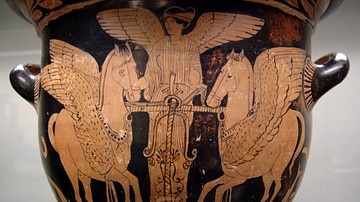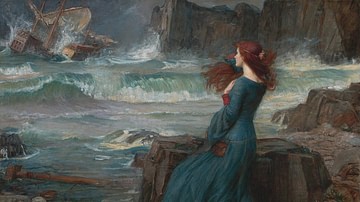Search
Did you mean: Muse?
Search Results

Definition
Harriet Jacobs
Harriet Jacobs (l. c. 1813-1897) was a former slave, abolitionist, and author of Incidents in the Life of a Slave Girl (1861), her autobiography, describing her life as a slave in North Carolina, her flight to freedom in the North, and her...

Definition
Eos
Eos is the personification and goddess of the dawn in Greek mythology. She is the daughter of the Titans Hyperion and Theia and the sister of Helios (Sun) and Selene (Moon). Dressed in a saffron-coloured mantle, Eos rides on her chariot in...

Definition
Kauravas
The Kauravas are the 100 sons of the King of Hastinapur, Dhritarashtra, and his wife Gandhari who played a significant role in the legendary Indian epic, the Mahabharata. Hastinapur is assumed to be the current modern state of Haryana, and...

Definition
Prometheus Bound
The Greek dramatist Aeschylus (c. 525 - c. 456 BCE) is considered one of the greatest tragic playwrights of his generation. He is often referred to as the “Father of Greek Tragedy.” Older than both Sophocles and Euripides, he was the most...

Definition
Apsaras and Gandharvas
In the Vedas, the apsaras are water nymphs, often married to the gandharvas. By the time the Puranas and the two epics were composed, the apsaras and gandharvas had become performing artists to the gods; the apsaras are singers, dancers...

Definition
Mesopotamian Naru Literature
Mesopotamian Naru Literature was a literary genre, first appearing around the 2nd millennium BCE, which featured a famous person (usually a king) from history as the main character in a story that most often concerned humanity's relationship...

Definition
Foundation Decree of Cyrene
The Foundation Decree of Cyrene (c. 322 BCE) is a covenant between the citizens of Cyrene in North Africa in the 4th century BCE and those of their mother-state of Thera granting any who wish to become Cyrenean citizens the same rights and...

Definition
The Tragedy of Richard III - Shakespeare's First Great Villain
The Tragedy of Richard III, often referred to as simply Richard III, is a history play by William Shakespeare (1564-1616), probably written around 1592-94. It is the fourth and final installment of the 'first tetralogy' of Shakespeare's history...

Definition
Soma - The Elixir of the Hindu Gods
Soma was a fermented juice drink which was believed to have been consumed by the Hindu gods and their ancient priests, the brahmanas, during rituals. Thought to be an elixir its consumption not only healed illness but also brought great riches...

Definition
The Tempest - Shakespeare's Magical Tragicomedy
The Tempest is a play by William Shakespeare (c. 1564-1616), written in 1610 or 1611, and first performed for the court of James I of England (r. 1603-1625) on 2 November 1611. Believed to be the last play that Shakespeare wrote on his own...